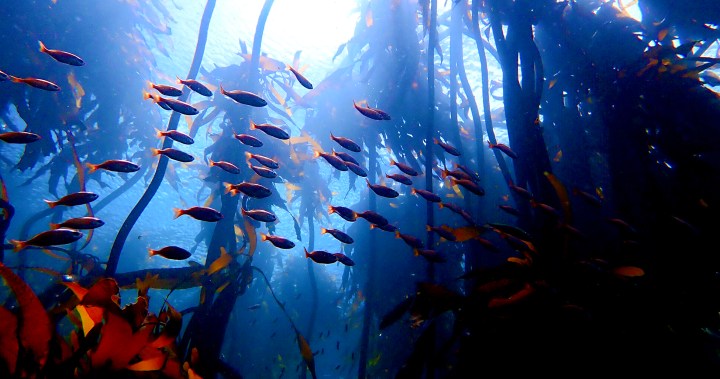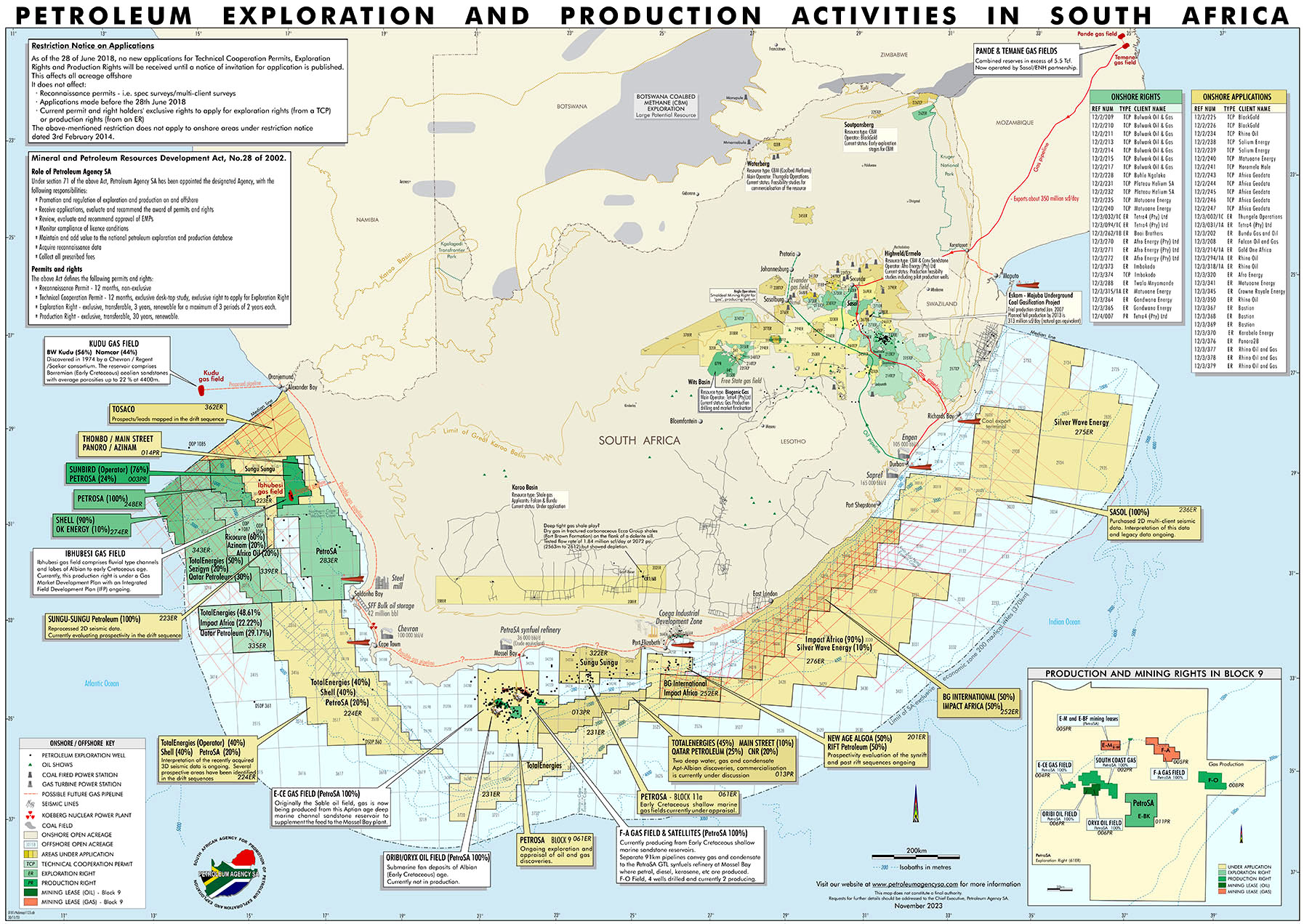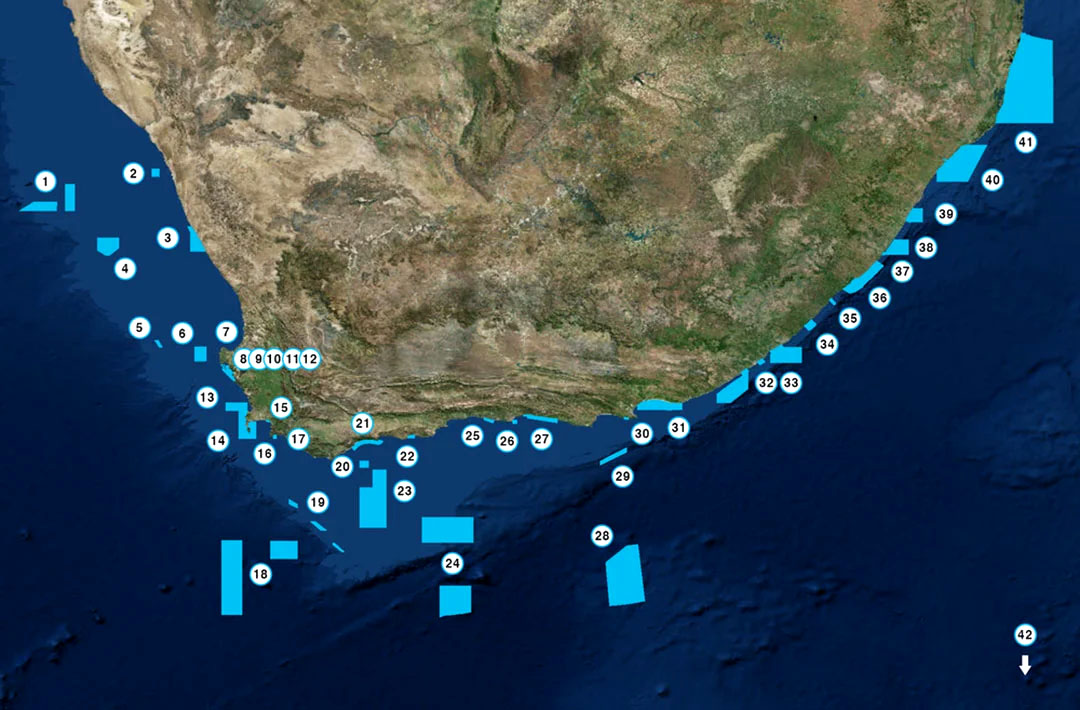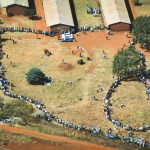MARINE CONSERVATION
Reach out, speak out, paddle out: False Bay sea forests and other spots of hope

‘It is through our love of the ocean that we find solace, and rekindle the feelings of hope, joy and wonder that inspire us to reach out, speak out and paddle out together.’
Bright and early on Saturday morning, close to 100 divers, surfers, kayakers, cold water swimmers, marine scientists and ocean activists, armed with pretty much anything that floats, gathered on Long Beach in Simon’s Town to paddle out and meet Dr Sylvia Earle.
The paddle-out was hosted by Cape RADD and Mission Blue.

Gathering at African Sea Forests in False Bay Hope Spot, Cape Town. (Photo: Ian Mackie)
We came together as an ocean community to celebrate our love for the ocean and to raise awareness of the incredible biodiversity of the African sea forests in False Bay, designated a “Hope Spot” in 2014.
For those who haven’t heard of “Her Deepness”, Dr Sylvia Earle is an extraordinary woman and global champion for marine conservation. She holds the record for the deepest walk on the sea floor and is a National Geographic Explorer and world-renowned expert on marine biology.
In 1995, she published Sea Change: A Message of the Oceans, a call to action to preserve the Earth’s oceans.

Krishia Govender at African Sea Forests in False Bay Hope Spot, Cape Town. (Photo: Krishia Govender)
Then in 2009 she established Mission Blue to ignite public support for a global network of marine protected areas – Hope Spots large enough to save and restore the ocean, the blue heart of the planet.
False Bay is one of eight Hope Spots off the South African coast. Others include the Whale Coast (off Hermanus and Walker Bay), Knysna Bay, Plettenberg Bay, Algoa Bay and Aliwal Shoal.
Many of Mission Blue’s Hope Spots coincide with sites that fall within South Africa’s network of 41 Marine Protected Areas (MPAs) that are strung like turquoise jewels along our coastline, helping to protect around 5% of our coastal waters and marine life from exploitation.
South Africa’s Marine Protected Areas
While the MPAs are managed by the Department of Forestry, Fisheries and the Environment, the Hope Spots aim to bring together local scientists and ocean lovers to stimulate a wave of community engagement, education and support for ocean conservation that will influence leaders and policymakers.
Yet these seeds of hope – so bright, beautiful and full of ocean life – feel particularly fragile at a time when we are facing an onslaught of gas and oil exploration in South African waters, with 20 active exploration and seven production rights ongoing at the moment.

(Source: Petroleum Agency SA)
The Ramform Atlas is conducting a 127-day seismic survey off the West Coast – blasting the seafloor with powerful airguns at 250 decibels every 10 seconds around the clock. A second survey is set to begin between Plettenberg Bay and Algoa Bay.
For me, all life is interconnected. So, as we work together to ignite hope and celebrate our love of our oceans, we also need to fight – and fight hard – to protect them.
Whatever it is that we love – from the whales and sharks to the dolphins, turtles and shoals of silvery fish (which I find so mesmerising), we need to raise a flag that proclaims, Oceans Not Oil.

Lori Lake kayaking at Three Anchor Bay. (Photo: Ian Mackie)
I kayak off Three Anchor Bay on Cape Town’s Atlantic Seaboard as often as I can, treasuring our fleeting encounters with the humpback and southern right whales.
I worry about the impact of the seismic surveys on these gentle giants of the deep, and how the burning of more fossil fuels is likely to push a rapidly warming ocean and planet beyond their tipping points.
This is why I am a great supporter of Oceans Not Oil’s efforts to protect our coastlines and the central role they have played in raising awareness, mobilising communities and challenging industry and government to build an economy beyond gas and oil that is fit for future generations.

Marine Protected Areas. (Source: Save Our Seas Foundation)
There are many ways in which we can raise the flag – starting small by asking questions and sharing what we know with friends and family.
The Oceans Not Oil website is an excellent place to find out more about the impacts of fossil fuels on our climate and oceans; the dangers of seismic surveys, and the many ways in which we can get involved – from signing petitions and attending paddle-outs and protests, to registering as an interested and affected party and raising our objections to further exploration off our coasts.
But as Sylvia Earle rightly says – it is through our love of the ocean that we find solace and rekindle the feelings of hope, joy and wonder that inspire us to reach out, speak out and paddle out together. DM
This article first appeared on oceansnotoil.org on 12 February 2024.
Lori Lake is a communication and education specialist at the Children’s Institute, University if Cape Town but is writing here in her personal capacity as an ocean lover and activist





















 Become an Insider
Become an Insider
Comments - Please login in order to comment.